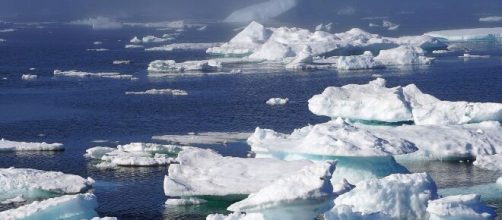Those in the know have sounded the alarm bells about the Atlantic Ocean and its currents that are gradually slowing down. This does not auger well for the world's health because it would directly impact global weather patterns and sea levels. It might not happen immediately, but the world cannot ignore the possibility.
Climate scientists blame the slowdown of ocean circulation on global warming. Potsdam University professor Stefan Rahmstorf says: "This has been predicted, basically, for decades that this circulation would weaken in response to global warming." Waters of the oceans circulate across the planet Earth, and it is known as the Atlantic Meridional Overturning Circulation AMOC.
Scientists blame the North Atlantic for the slowdown.
CNN says Greenland plays a major role in this part of the ocean. Its ice continues to melt, and glaciers keep separating. These float away and contribute to the rise in sea levels. Those who reside in the coastal areas face the risk of floods and sometimes lose their habitats. It also retards the speed of circulation. Experts predict strong cooling in Europe that would affect coastal areas of Britain and Scandinavia. Treating the slowdown as natural would be incorrect because it would be the consequences of human influence.
Ignoring connection to the Atlantic Ocean not correct
The AMOC influences the global climate. This is more so for North America and Europe.
There have been instances of ice melting in Greenland and heavy rainfall over the North Atlantic. These are effects of climate change that have disturbed the salinity and density of the waters. The consequence of global warming is evident across parts of the North Atlantic Ocean. In December 2019, the Swedish climate activist Greta Thunberg arrived in Lisbon for COP25 after crossing the Atlantic. CNN adds slowdown of ocean circulation has a direct impact on sea levels of the US East Coast. The rise in sea-level is due to factors like melting of ice sheets and warming of oceans. The National Oceanic and Atmospheric Administration NOAA confirm a rise of 8 to 9 inches over nearly one and half centuries.
This is a matter of concern.
Uneven circulation in the Atlantic Ocean could mean major climatic disorders
Science says warm water currents move towards the north, which is cold. Later they retrace their steps and turn back south once it cools down and becomes heavier. However, freshwater from the melting ice causes this turn to be slower because of reduced salinity. The net result is an increase in heatwaves across Europe and weather disturbances in the United States. Hurricanes mean loss of properties, damage to infrastructures, and downed power lines. Travel becomes a nightmare, and people have to depend on renewable energy. Such climatic disorders affect humans as well as marine organisms that rely on ocean currents for survival.
The whole ecosystem is interconnected with factors like a supply of nutrients and maintaining proper temperature and salinity levels. CNN quotes NOAA that says the pace of global sea-level rise more than doubled throughout most of the twentieth century. In August 2020, the Greenland ice sheet's melting due to global warming reached the point of no return.
The Atlantic Ocean holds the key
According to CBS News, the Atlantic Ocean plays a vital role in redistributing heat throughout our planet's climate system. It is now slowing down, and the phenomenon could bring miseries. In scientists' opinion, the slowing down has links to global warming and the melting of ice. These alter the ecological balance in the Northern waters. Inability to limit the warming could be disastrous. Incidentally, ice in Greenland is melting at a fast pace because of climate change-induced by humans.


